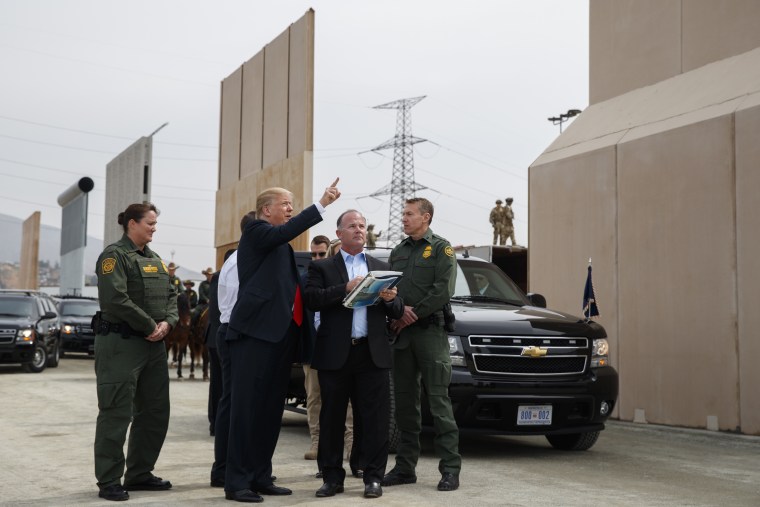At a campaign rally last week, Donald Trump talked up the idea of closing the United States' southern border, insisting that it would be "very simple," and no one should listen to those who "make it too complicated." He may have gotten the idea from conservative media, which pushed the idea the night before.
The day after the event, the president published a strange series of tweets, culminating in a threat to close the border this week. To prevent such a drastic move, he wrote, Mexico would have to "immediately stop ALL illegal immigration coming into the United States throug [sic] our Southern Border."
Asked on ABC's "This Week" yesterday what it would take for the president not to close the border, acting White House Chief of Staff Mick Mulvaney replied, "Something dramatic."
Trump elaborated on his perspective -- sort of -- during a brief Q&A at Mar-a-Lago.
"...Mexico is going to have to do something; otherwise, I'm closing the border. I'll just close the border. And with a deficit like we have with Mexico and have had for many years, closing the border will be a profit-making operation. [...]"So you close up the border and you watch the drugs go way down too. But I will close the border if Mexico doesn't get with it, if Mexico doesn't stop it."
I don't know if Trump is playing some kind of weird game or bluffing in the hopes of gaining poorly defined concessions, but even more than usual, his position is hopelessly incoherent.
As many have no doubt tried to explain to him, for the United States to have a trade deficit with a country does not mean we're losing money. Similarly, ending trade with a country with which we have a trade deficit does not automatically create a "profit."
I realize the president likes to pretend this is his signature issue, but he really ought to avoid using words and phrases if he doesn't know what they mean.
But even putting these relevant details aside, Dara Lind highlighted the expected economic consequences of such a policy in the event of Trump following through on his threat.
Shutting down ports of entry would be an economic disaster. It would also disrupt the lives of border communities that rely on the flow of people between the US and Mexico -- including the major cities of San Diego (and Tijuana) and El Paso (and Ciudad Juarez).Approximately $1.5 billion worth of commerce happens along the US-Mexico border every day. Nearly half a million people cross the border legally every day through Texas ports alone.Even reductions in port capacity or temporary shutdowns tend to lead to panic among the business community and local residents. El Paso is currently concerned that already-long waits at the ports could get longer as agents are reassigned to care for unauthorized migrants. When the San Ysidro port of entry in San Diego shut down for a few hours in November, as agents responded with force (including tear gas) to an organized march of asylum seekers, the temporary closure cost about $5.3 million in lost business revenue.
I wouldn't be surprised if someone in the White House told Trump about this, but remember, he doesn't like to hear from people who make border issues "too complicated."
So, what's next? There are a handful of ways this could unfold in the coming days:
1. Trump could follow through on his threat and risk the consequences.
2. He could fold, backing down before there are any real consequences, and embarrass himself again -- just like when he retreated at the end of his government shutdown.
3. Mexico could make some kind of meaningless gesture, which the Republican could exaggerate the significance of, as some kind of elaborate face-saving scheme.
4. Trump could pretend that Mexico did something dramatic, take credit for the imaginary breakthrough, spend months bragging about the non-existent development, and hope the public doesn't notice.
5. Trump could pretend he never made these threats, while quietly hoping we all forget what he said.
Which of these will happen? Your guess is as good as mine, but we probably won't have to wait too long to find out.
